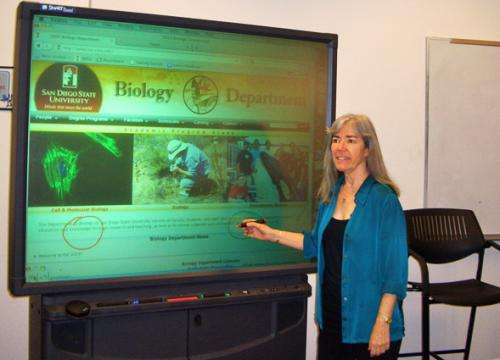Why science professors with education expertise are frequently unhappy with their jobs

There's a large chasm between the professional expectations of university science educators and their day-to-day reality, according to new research led by a team of science education experts.
In a paper published today in the journal BioScience, the researchers delve more deeply into the misalignment of perceived motivations for hiring and the impacts of these science faculty who are working to improve the way science is learned and taught from kindergarten through college.
One of the top priorities among education and workforce policy officials in the United States is better preparing the nation's students for careers in the science, technology, engineering and math (STEM) fields. Toward that end, there has been a push in science education to reevaluate the ways in which children and adults are taught about science and math, according to San Diego State University biology professor and study coauthor Kathy S. Williams.
"The country has identified a need for better science learning and science literacy," Williams said. "One of the ways to achieve that is to encourage faculty to do research on science education, to look at the way we learn in a very scientific way."
Teaching teachers
Enter the SFES, or science faculty with education specialties. These are scientists who take on specialized roles within science education in their disciplines. SFES play many roles in K-12 teacher training, undergraduate curriculum development, and disciplinary-based science education. The hiring of SFES at universities to improve schools' science education has been a big trend over the last decade, as Williams and her colleagues reported in the Proceedings of the National Academy of Sciences in 2013.
"SFES are not primarily teachers," Williams emphasized. "They do research and bring in funding at a level similar to their non-SFES peers."
What's less clear, she explained, is whether these SFES feel like they are having an impact on education. One alarming study by Williams and her coauthors, published in Science in 2008, found that nearly 40 percent of surveyed SFES said they were "seriously considering leaving" their current jobs, suggesting dissatisfaction with their role, Williams said.
To get a clearer picture of the sentiment behind such numbers, Williams and colleagues surveyed 289 self-identified SFES from universities across the country and asked them to respond to four questions:
- Why are science departments hiring SFES?
- What valuable professional contributions do you think SFES could make?
- What contributions are you, as an SFES, actually making?
- What advice do you have for current or aspiring SFES?
When the researchers analyzed the survey data, they uncovered a surprising result. They found was a profound disconnect between what SFES believe SFES are hired to do, what they believe SFES could do, and what they actually do contribute in their professional roles.
"We didn't expect to see the level of misalignment that we did," Williams said.
Expectations versus reality
The biggest reason SFES believe they were hired is to prepare future science teachers in the K-12 setting, with 40 percent of respondents expressing this perception. Yet only 23 percent listed teacher preparation as one of the three most valuable contributions that SFES could make, and 20 percent listed it as one of the three most valuable contributions they actually do make to their department.
Instead, the top contributions SFES believe they are making are developing and reforming curriculum (34 percent) and serving as a pedagogical resource for other faculty (32 percent). Only 24 percent and 22 percent, respectively, believe SFES are being hired for those reasons.
That misalignment between SFES' perceived expectations from their departments and their actual contributions could fuel job dissatisfaction and motivate SFES to seek positions at different institutions, Williams said. These studies suggest that's especially true when SFES aren't entirely clear on the benchmarks that will be used for their tenure review and promotion.
What is needed is a sharper impression of expectations during the hiring process, she added, so that SFES and departments both know the specific strengths these specialized faculty members bring to the university.
"The scholarship of teaching and learning is really valuable and shouldn't be ignored," Williams said.
More information: "Misalignments: Challenges in Cultivating Science Faculty with Education Specialties in Your Department." BioScience first published online November 26, 2014 DOI: 10.1093/biosci/biu186
"Science Faculty with Education Specialties." Science 19 December 2008: DOI: 10.1126/science.1162072
Journal information: Science , BioScience , Proceedings of the National Academy of Sciences
Provided by San Diego State University


















